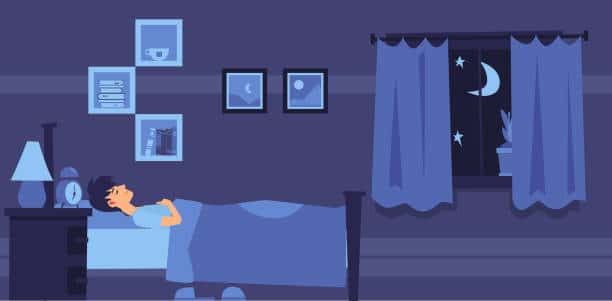- December 26, 2022
- Avi Charlton
- Uncategorized
Getting a good night sleep is very important. Sleep is very important for many bodily functions. Sleep is important for memory and learning activity. Sleep is also important for your immune system. Lack of sleep can result in reduced immunity. It may even increase your risk of infections or cancer. Lack of sleep also increases your risk of cardiovascular disease by increase inflammation and cortisol level. Hence sleep is a non-negotiable lifestyle necessity.
Over a period of time, disruption in circadian rhythm increases your risk of poor gut health, immune disease, metabolic disease, heart disease, hypertension, mood disorders, neurodegenerative disorders, reproductive disorders, cancers, dementia. Sleep deprivation causes stress, increased pain, poor memory. In adolescent and children, sleep deprivation increases behavioural problems, reduced cognitive performance.
The most important tip is REGULARITY – go to bed the same time and wake up the same time.
Does Lack of Sleep Cause Weight Loss or Gain?

To answer the question: ‘Does Lack of Sleep Cause Weight Loss or Gain?’, we can discuss how sleep deprivation impacts weight management. Contrary to what some might think, lack of sleep is more likely to cause weight gain rather than weight loss. This is primarily due to the fact that poor sleep can disrupt the body’s metabolism and the regulation of hormones related to hunger and fullness.
When an individual is sleep-deprived, the production of ghrelin, a hormone that stimulates appetite, increases, while the production of leptin, a hormone that induces feelings of fullness, decreases. This hormonal imbalance can lead to increased calorie intake, potentially resulting in weight gain.
Moreover, lack of sleep can lead to physical inactivity due to tiredness, further contributing to weight gain. It’s also worth noting that individuals who are awake for longer periods may have more opportunities to eat, particularly foods high in saturated fats.
In addition, sleep deprivation can cause a spike in cortisol, a stress hormone that signals the body to conserve energy, which can lead to fat retention. Studies have shown that individuals who get sufficient sleep are more likely to maintain a healthy weight and even achieve weight loss.
Therefore, ensuring adequate sleep is as crucial to weight management as diet and exercise. Improving sleep quality can be achieved through various methods such as regular exercise, practicing mindfulness and yoga, and reducing the use of electronic devices before bedtime.
Exclude Other Medical Conditions
There are medical conditions that may be the cause of poor sleep. This list is not exhaustive:
- Sleep apnea
- Bruxism or grinding of teeth
- Restless legs
- Chronic pain
conditions - Urinary frequency
- Medications
- Other medical conditions – thyroid, iron, anxiety, menopause, insulin resistance
Getting a Good Night Sleep

Environmental Tips
- Make sure your bedroom is dark, cool, quiet, comfortable, relaxing.
- Choose comfortable bedding. Avoid mattress that is too firm or too soft.
- Cut yourself from outside noise or outside light.
- Aim a cooler temperature in your bedroom for optimal sleep.
- Hide all clocks or screens. Avoid charging your devices in your room or next to your bed. If you can turn off wi-fi at night, that is even better.
Tips During the Day
- Natural light first thing in the morning can help your body produce natural melatonin. E.g. go for a walk or sit in the backyard first thing in the morning.
Click here to explore more benefits that come from getting sunlight in the morning - Keep as active as possible. Taking time to do exercise (other than work) is helpful for physical health as well as mental health.
- Avoid stimulants that may interfere with sleep, esp in the afternoon – caffeine, alcohol, nicotine
- Avoid afternoon naps longer than 30 minutes, especially late in the afternoon.
- Learn how to manage stress. For example going for walks, learning to do meditation.
- Healthy eating. Eat whole foods, real foods, avoiding refined sugars and carbohydrates can be helpful for sleep.
- Some supplements/ herbs may be helpful including melatonin, magnesium, zinc, valerian, camomile tea.
In the Evening
- Avoid strenuous activities late in the evening, at least 3 hours before bedtime.
- Avoid eating at least 3 hours before bedtime. Time restricted eating also has beneficial effects on sleeping, e.g. limiting your eating window to 8 or 12 hours a day, finishing at least 3 hours before bedtime so digestion is finished.
- Do not drink large quantities of fluids before bedtime.
- Avoid alcohol, cigarettes or other stimulants, e.g. coffee, coke, tea. Avoid alcohol 3 hours before bedtime.
- Go to bed when you are tired.
- Avoiding screen time 1 hour before bedtime can be helpful. Using blue light filter glasses or computer apps e.g. f.lux, can be considered. Dim the light in the evening can be helpful.
- Herbal teas such as lemon balm, Passion flower, tulsi, valerian can be considered.
- Magnesium – either supplement or bath or oil can be helpful.
- Other supplements -high dose vitamin D, GABA, lavender oil.
- Establish a good bedtime routine and stick to it. Go to bed at the same time each night even on weekends. Do the same thing, e.g. brush your teeth, go to the toilet, meditate for 2-5 minutes or deep breathing exercises.
- Practicing yoga before bedtime can be beneficial for sleep.
- Watching the sunset would be a great idea.
- Reducing electromagnetic field exposure can be helpful, e.g. turn off wifi or charging devices away from bedroom.
While in Bed

- Your bed is for sleeping. Avoid other activities like watching TV or reading in bed. The only exception is sexual activity.
- Don’t watch the clock. Don’t have the phone next to your bed, especially turn off notifications on phones.
- If you can’t sleep, get up, do something calm and relaxing. Wait until you are tired and try going to sleep again.
- The best time for good quality sleep is between 10pm to 2am. These hours go towards paying back sleep debt. The next few hours go towards nurturing the brain and body, ie repair and rejuvenation.
- 7-8 hours of sleep every night is optimal. Children will need 9-11 hours of sleep.
- Sleeping less than 6 hours a night, overnight, can demolish your immune system and increase risk of cancer.
On Waking
- Get up the same time each morning, even on weekends. Sleeping in disrupts sleeping habits.
- Once awake, get out of bed.
- Once you get up, try to expose yourself to daylight. Getting outside to sunlight will also be helpful to help the body produce melatonin for the night time. For example, 10-15 minutes of sunlight in the morning, even if it’s just sitting in the backyard.
- Be consistent with a good lifestyle.
- Positive mindset. Practice gratitude. Take up meditation.
Factors That Can Affect Your Sleep

- Eating simple carbohydrates before bed time can give you a sugar crush and hence affect your sleep.
- Abnormal light exposure, i.e. not enough sun during the day or too much artificial light at night.
- Preservatives or colourings in foods.
- Allergic foods before bedtime.
- Electromagnetic field – turning off the wifi can be a good idea.
- High protein snack before bedtime.
- Low Vit D.
- Low magnesium.
- Lack of physical activity.
- Concurrent illnesses, e.g. menopause, mental health illness.
Conclusion | Lack of Sleep and Weight Loss
In conclusion, the relationship between sleep and weight is complex. While it may seem counterintuitive, lack of sleep can lead to weight gain rather than weight loss. This is due to a variety of factors including hormonal changes, increased appetite, and decreased physical activity.
Getting a good night’s sleep is not just about the number of hours spent in bed. It’s also about the quality of sleep and the environment in which we sleep. Simple environmental changes such as reducing noise and light, maintaining a comfortable temperature, and investing in a good quality mattress can significantly improve sleep quality.
Furthermore, our daily habits play a crucial role in our sleep patterns. Regular exercise, a balanced diet, and avoiding caffeine and electronics close to bedtime can all contribute to better sleep.
Upon waking up, it’s important to establish a regular routine and expose ourselves to natural light to help regulate our body’s internal clock.
In essence, sleep is a vital, often neglected, component of every person’s overall health and well-being. Sleep is important because it enables the body to repair and be fit and ready for another day. Getting adequate rest may also help prevent excess weight gain, heart disease, and increased illness duration. It’s not an area of our health that we can afford to neglect. If you’re having sleep problems, it’s important to address these issues and consider seeking professional help if necessary. Remember, a good night’s sleep is not a luxury, it’s a necessity.
Find out if Inflammation causes Weight Gain
Other help
Helpful tools and podcasts
- http://sleepbetter.com.au
- https://www.sleepschool.org/
- https://sleephub.com.au
- https://www.sleepdiplomat.com/
- Overcoming Insomnia by Colin Espie book
- The Sleep book by Guy Meadows
Disclaimer
This article does not provide treatment or individual medical advice. Please see your own medical practitioner about change in lifestyle.
I am Dr Avi Charlton.
I have a special interest in nutrition and lifestyle medicine.
You can contact me at
avi.charlton@mlcclinic.com.au
Follow me on Facebook or Instagram dr_charlton_low_carb_GP


